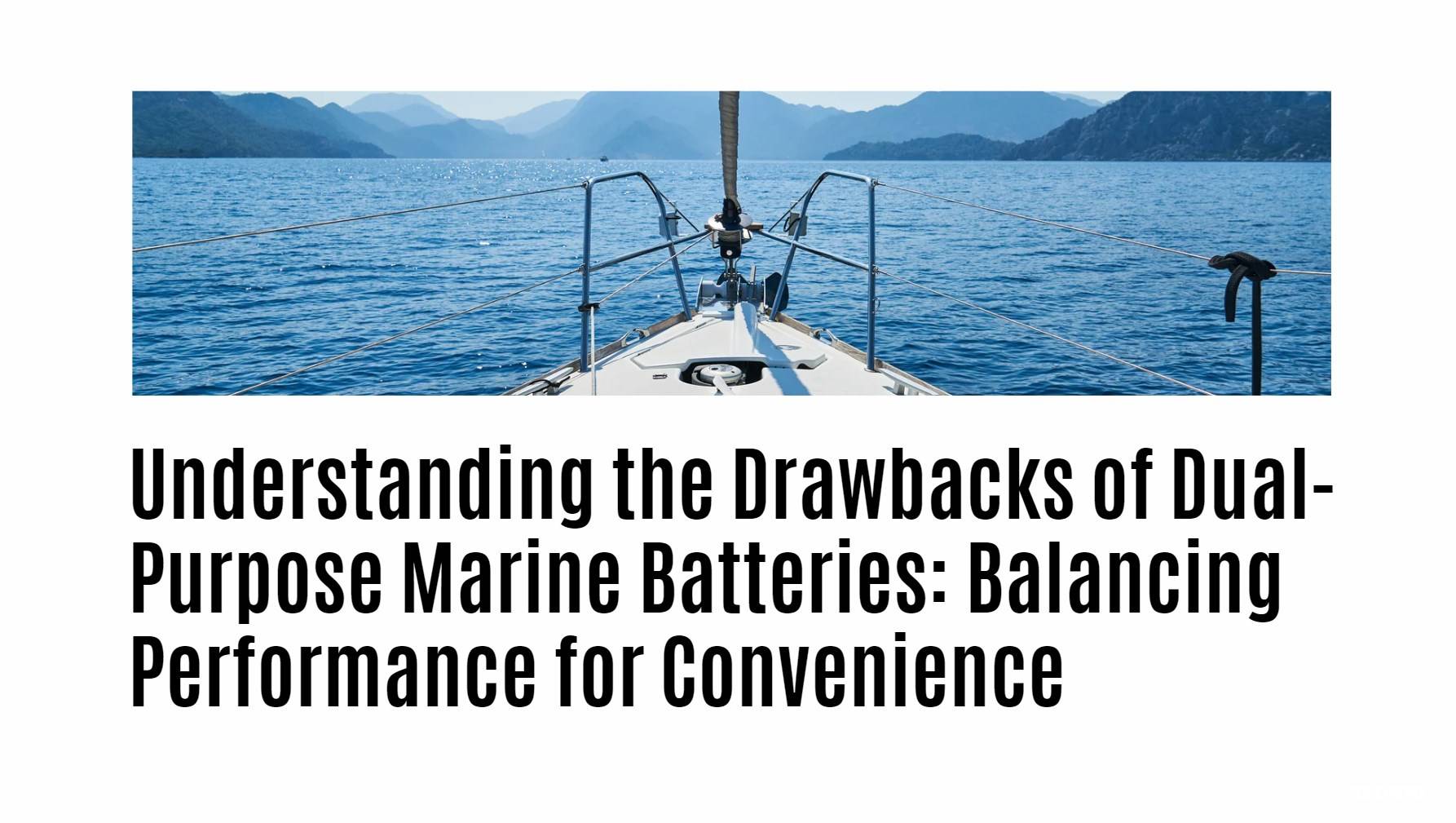
Blog
Understanding the Drawbacks of Dual-Purpose Marine Batteries

Dual-purpose marine batteries offer a blend of convenience and functionality by combining the capabilities of starting engines and powering onboard electronics. However, understanding their drawbacks is essential for boaters seeking optimal performance from their power systems.
What Are Dual-Purpose Marine Batteries?
Dual-purpose marine batteries are designed to serve two primary functions: starting an engine and providing power to electrical devices aboard a vessel. This versatility makes them appealing to boaters who want to simplify their power management systems without sacrificing performance.
What Are the Advantages of Dual-Purpose Marine Batteries?
Advantages include:
- Versatility: They can handle both starting and cycling duties, making them suitable for various applications.
- Space and Weight Savings: By using one battery instead of two (a starting battery and a deep-cycle battery), boaters can save space and reduce overall weight.
- Cost-Effectiveness: Purchasing one dual-purpose battery is generally more affordable than buying separate batteries for different functions.
What Are the Drawbacks of Dual-Purpose Marine Batteries?
Despite their benefits, dual-purpose batteries have notable drawbacks:
- Not Optimal for Long-Term Power: While they can perform both tasks, they may not deliver the same performance as dedicated deep-cycle batteries when running electronics over extended periods.
- Shorter Lifespan Under Heavy Use: Frequent deep discharges can wear out dual-purpose batteries faster than dedicated deep-cycle models.
- Limited Cranking Power: They may not provide sufficient cranking power for larger engines or in extreme cold conditions compared to dedicated starting batteries.
How Do Dual-Purpose Batteries Compare to Deep-Cycle Batteries?
Dual-purpose batteries offer flexibility but come with compromises:
- Deep-Cycle Batteries: Specifically designed for sustained energy output over long periods; ideal for powering electronics without damage from deep discharges.
- Dual-Purpose Batteries: Serve well in moderate use scenarios but may struggle under heavy cycling demands.
What Maintenance Is Required for Dual-Purpose Marine Batteries?
Regular maintenance practices include:
- Checking charge levels regularly to prevent deep discharges.
- Cleaning terminals to avoid corrosion that can impede performance.
- Ensuring proper connections are secure to maintain efficiency during use.
What Factors Should Be Considered When Choosing a Battery?
When selecting a battery, consider:
- The specific power needs of your boat’s systems.
- The types of devices you plan to run.
- Expected usage patterns, including how often you will be using high-drain devices.
How Do Environmental Conditions Affect Battery Performance?
Environmental factors significantly impact battery efficiency:
- Cold temperatures can reduce effective capacity and make it harder to start engines.
- High temperatures may lead to increased self-discharge rates and accelerate degradation.
What Innovations Are Emerging in Battery Technology for Marine Use?
Innovations driving advancements include:
- Development of lithium-based technologies that offer higher energy densities and longer lifespans.
- Enhanced battery management systems that optimize charging cycles and improve safety features.
- Improved recycling processes aimed at reducing waste from used batteries.
What Are the Best Practices for Charging Dual-Purpose Batteries?
Best practices for charging include:
- Using chargers specifically designed for dual-purpose or marine batteries.
- Avoiding overnight charging unless equipped with smart technology that prevents overcharging.
- Regularly monitoring charging times to ensure optimal performance without risking damage.
How Do Different Battery Types Affect Boating Performance?
Different types of batteries impact overall boating performance by:
- Providing varying levels of energy density, which affects how long devices can run on battery power.
- Influencing the weight and space requirements on the vessel, which can be crucial for balancing and handling.
What Should You Do If Your Battery Fails on the Water?
If your battery fails while on the water, follow these steps:
- Assess the Situation: Determine if the issue is with the battery or another component of your electrical system.
- Attempt to Jump Start: If you have access to another boat, you may be able to jump-start your battery.
- Use a Backup Power Source: If available, switch to an auxiliary power source or a backup battery.
- Call for Assistance: If you cannot resolve the issue, contact a marine service for help.
Conclusion
Understanding the drawbacks of dual-purpose marine batteries is essential for any boater looking to balance performance with convenience. While these batteries offer versatility and space-saving benefits, they may not always provide the best performance under heavy use compared to dedicated batteries. By considering factors such as maintenance, environmental conditions, and proper charging practices, boaters can make informed decisions that enhance their overall experience on the water.
Expert Views
“Choosing the right battery type is crucial for ensuring reliable performance on the water,” states a marine technology expert. “Dual-purpose batteries can be a great solution for casual users, but understanding their limitations is key to avoiding issues during critical moments.”
FAQ Section
- Can I use a dual-purpose battery for starting my engine?
- Yes, dual-purpose batteries are designed to handle both starting engines and powering electronics.
- How often should I check my dual-purpose battery?
- Regular checks are advisable every month or before significant usage periods to ensure optimal performance.
- What happens if I over-discharge my dual-purpose battery?
- Over-discharging can lead to reduced lifespan and potential damage to the battery, affecting its ability to hold a charge.
- Are dual-purpose batteries more expensive than traditional batteries?
- Dual-purpose batteries can be more expensive upfront, but they may save money in the long run by eliminating the need for multiple batteries.
- How can I extend the life of my dual-purpose marine battery?
- To extend its life, avoid deep discharges, maintain clean connections, and store it in a moderate environment when not in use.



